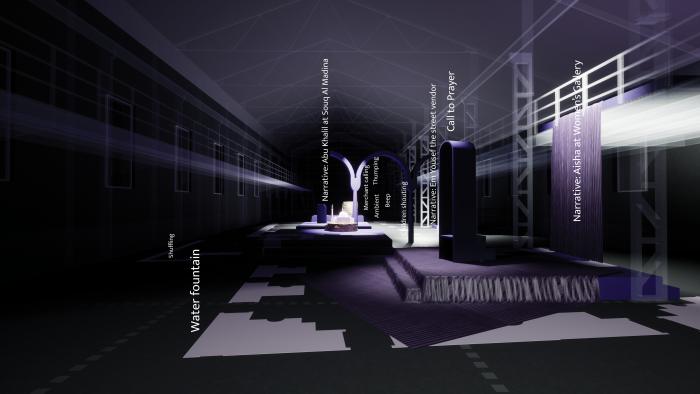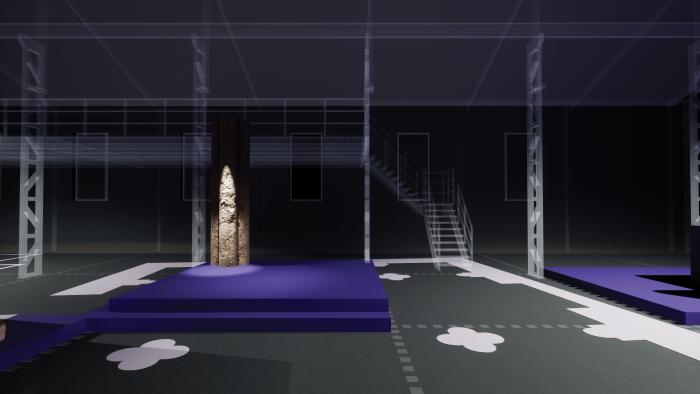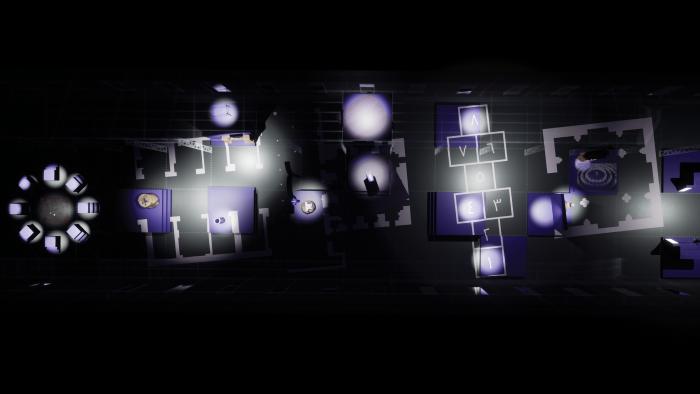I. SUMMARY INFORMATION
Project
269771
Status
Submitted
Award category
Mobilisation of culture, arts and communities
You want to submit
NEW EUROPEAN BAUHAUS RISING STARS : concepts or ideas submitted by young talents (aged 30 or less)
Project title
The Hakawati Forum
Full concept/idea title
Reclaiming the Lost City of Aleppo Through Sound and Narrative
Description
The project aims to use intangible forms of heritage, specifically augmented reality (AR) soundscapes and narratives, to reconstruct lost spaces of Aleppo and overlay them onto new contemporary contexts. We must no longer look at heritage and preservation as retrospective activities but rather as prospective ones. It reinterprets the traditional Arabic story-telling structure, Hakawati, by transforming it into a spatial structure that brings to light counter-narratives and puts them in dialogue.
Where is your concept/idea being developed or intended to be implemented in the EU?
Belgium
Brussels
Digue du Canal 10
Anderlecht
1070
II. DESCRIPTION OF THE PROJECT
Please provide a summary of your concept/ idea
The Syrian government’s post-war reconstruction plan serves existing generational, sectarian and gender prejudices. The reconstruction of Aleppo’s lost spaces brings an opportunity to tackle it’s multi-layered conflicts. The project, meant to be part of the Brussels VI Conference on Supporting the Future of Syria & the Region, looks at intangible cultural heritage as a prospective strategy for change rather than a retrospective one. Adapting Hakawati story-telling, a now endangered practice in Syria, it condenses the soundscapes and narratives of marginalized and subjugated voices from Aleppo in an AR audio. The Hakawati works within a non-linear framework with a clear hierarchy of embedding a story within a story in multiple levels, constantly shifting scales. The project has multiple effects at these multiple levels, from shifting perspectives and changing attitudes to proposing new policies. At a personal level, it strives to build connections between what is heard and what the participant has personally experienced, whether he/she is from Aleppo or not, in order to build a sense of agency. At a larger level, it strives to reveal alternative accounts within dominant discourses, be it conflicts around gender, generational tensions, planning policies, etc. in an attempt to find a more embodied way of thinking about the connections between personal agency and socio-political structures. The various layers of the space are realized as a result of the actions of the participant, who assembles them into a personal construct where they are able to make links between personal experiences and larger institutional realities. The space is a forum in itself, so the participant is able to express thoughts, propose suggestions, imagining alternative realities and start conversations around how to provoke change within socio-political structures.
Please give information about the key objectives of your concept/idea in terms of sustainability and how these would be met
In terms of sustainability, no physical structure is built. Instead, the project focuses on maintaining and preserving a lifestyle through individual and collective memories associated with the original spaces in Aleppo by rebuilding through sound. The floors of the hangar will be marked with the floor plans of the initial sites in Aleppo. Through the augmented reality interface, which has already been tested successfully in a similar hangar, the listener navigates around the taped floor plans, listening to its augmented soundscapes and narratives. Simple stage lights and props are used for reference and direction, as shown in the uploaded image. All the props are made out of recycled plywood and can be dismantled to be reerected in future venues or re-modeled to accommodate alternative themes. In terms of the choice of space, the Hangar du Kanaal was chosen because it has an open plan layout that merely functions as an envelope with no obstructive features, and it blocks out any direct daylight. Designing for a neutral space like this allows the installation to be adapted into many other contexts, travelling to other cities around the EU, without needing to change anything.
Please give information about the key objectives of your concept/idea in terms of aesthetics and quality of experience beyond functionality and how these would be met
The Hangar du Kanaal is a large, double volume, neutral space. The Hakawati (Arabic for story-teller) becomes the core of the space. It informs the soundscape, lighting, props and movement of participants. 10 participants are invited into the space at a time. Each participant wears headphones at the start of the experience and scans a different point in the space using an app on their smartphones to activate the augmented soundscapes and narratives. The sound effects are transformed into modular compositions and are looped at different time intervals. They are built into an augmented reality space where the listener can experience and explore these spaces in the Hangar du Kanaal as if they still existed. Because each sound loops differently, no experience will ever be the same. At certain moments, the experience is very intimate, with dim spotlights dispersed at different points in the space for each participant to stand alone and completely focus on the narrative. At other moments, the space completely transforms, becoming fully lit and loud, where the participants can curate their own experience of the space and its soundscapes and can gather at certain points. This mixes both the individual and the collective experience. After the experience, the props can be reshuffled and the space re-arranged to allow for conversations, talks and performances to take place which are open to the public.
Please give information about the key objectives of your concept/idea in terms of inclusion and how these would be been met
Sound is both situated and fugitive, existing always in relation to others. It transcends generational and sectarian divides, bringing about the many voices of a mixed society and forcing new pathways for the reading of contested urban spaces in Aleppo and elsewhere. The Hangar du Kanaal, which functions as a community art space, is transformed into a story-teller, mediating between the people sharing their stories through the AR audio, and the people listening. The space transforms into a broadcast that shares stories and builds new links and associations between the stories told and the people listening. The theme of the space changes monthly, to tackle different tensions in Aleppo such as gender, generational or planning conflicts. Each theme brings with it particular spaces, stories and sounds. At a personal level, participants may sympathize or identify with narratives told, or make links between the sounds heard and ones from their memories. At an institutional scale, larger stakeholders are invited in to frame conversations around spatial practices (reconstruction and urban planning) and the theme at hand, in order to find proactive multi-disciplinary ways of tackling these conflicts.
Please explain the innovative character of your concept/ idea
The project looks at new ways of thinking about intangible cultural heritage proactively as a means of imagining alternative possibilities that challenge current socio-political conflicts. Through this, it turns towards the Hakawati traditional method of story-telling and readapts it spatially into contemporary contexts. Sound is often a neglected medium, especially in the built environment. We often are so concentrated on preserving buildings that we neglect the value of the events and interactions that happen within them. These values are intangible. Resorting to sound, as an intangible medium, abstracts these spaces and provokes a more intimate understanding of the spaces where the participants construct their own realities, through which they hopefully may develop a sense of agency to challenge the conflicts raised. Looking at AR as a means of preserving culture offers a very rare opportunity, where the preserved contexts (Aleppian spaces and narratives) can be superimposed onto completely different contexts. It could be experienced collectively in the hangar, or individually anywhere through the AR app.
Please detail the plans you have for the further development, promotion and/or implementation of your concept/idea, with a particular attention to the initiatives to be taken before May 2022
Initiatives before May 2022: Data Collection: This operates in two parts. The first is sampling and cataloguing extinct soundscapes of lost social and cultural spaces in Aleppo, Syria using existing prewar footage of the sites. Active soundscapes from pre-destroyed souqs, courtyards, mosques, swimming clubs and other social spaces in Aleppo are collected. Each sound is extracted and divided according to the site it is sampled from, then subdivided into continuous, intermittent and impulsive sound effects that are built into the augmented reality space. The second is collecting narratives based on conversations with Syrian Diasporic communities based in Belgium and elsewhere. Narratives of marginalized and subjugated voices are collected based on interviews and conversations. These narratives reveal the multiple layers of conflict, be it gender, generational, planning, etc. and are condensed and overlaid onto the hangar through the AR audio, placing opposing narratives from different parts of the city in dialogue. Event: The narratives and soundscapes are categorized according to theme. These themes will take over the event space of the hangar, alternating monthly. Participants for the events should start with members of the Syrian diaspora, but can spread to wider audiences to raise awareness to the conflicts facing Aleppo and Syria as a whole at a more personal level. The event should be launched at the same time of the Brussels V Conference on Supporting the Future of Syria and the Region, scheduled to take place in late March 2022. Groups can also make use of the space for performances, talks and discussions. Initiatives after May 2022: Broadcast: The events will be recorded and shared with relevant stakeholders depending on the themes. They can include UNESCO, AKDN, Municipality of Aleppo, Souriat a Syrian feminist radio station, etc. as a starting point to spark wider conversations at more institutional levels.
III. UPLOAD PICTURES
IV. VALIDATION
By ticking this box, you declare that all the information provided in this form is factually correct, that the proposed concept/idea has not been proposed for the New European Bauhaus Rising Stars Awards more than once in the same category.
Yes




